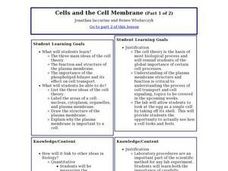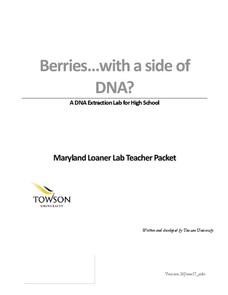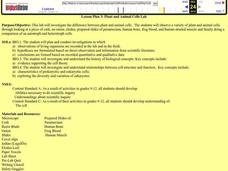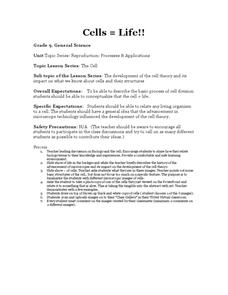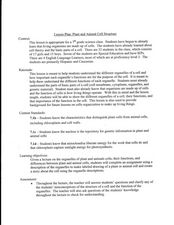Virginia Department of Education
Cell Parts
What do a bird, an egg, a rabbit, and a toad all have in common? This fun-filled resource explains the similarities and differences between cells and how all cells are similar, yet all are different. Learners begin by depicting a...
Curated OER
Cells and the Cell Membrane
Students investigate the properties of cell membranes by isolating the membrane surrounding chicken eggs. They set up an experiment by placing eggs in a vinegar solution for three days. A powerpoint lecture emphasizes the structure of...
Virginia Department of Education
The Cell Cycle and Mitosis
What a packed lesson! Provide your class with the opportunity to learn about the cell cycle in several exciting ways. Biologists first learn about the theory behind mitosis, then proceed to view onion tips under the microscope and create...
Biology Corner
Cell Theory Rap
All that this will link you to is a rap about cell theory and organelles. Use it as an example for a creative assignment in your biology class. Divide the class into groups and assign them a topic for which they write and perform a skit,...
Curated OER
Lesson Plan: The Cell- A Historical Perspective
Students discover the impact the invention of the microscope had on scientific discovery as well as the concept of spontaneous generation and the cell theory. Students examine these scientific concepts through a WebQuest and by viewing a...
Curated OER
7th Science Quiz
This seventh grade life science quiz has a professional appearance and well-written multiple-choice questions. However, it seems to cover too broad a variety of biology topics for only 15 questions to fully assess. There is one question...
Curated OER
Introduction to Biology
Students study cell theory and the link between it and technology. In this cell theory lesson students examine the importance of cell theory.
Pace University
Grade 6-8 Living Things
What characterizes a living thing? Scholars explore the concept during a differentiated instruction unit on living things. They perform lab experiments to determine how animals adapt to stimuli, watch videos and learn about...
Towson University
Berries...With a Side of DNA? (High School)
Is DNA still present after picking fruit or cooking vegetables? Biology scholars extract and collect DNA strands in an impactful lab. Working groups prepare their samples and compare their results to negative and positive standard...
Curated OER
WHAT IS A CELL?
Students explore the function and structures of cells, including plant and animal cells. They explore cell parts including cell wall, ribosomes, chromosomes, nucleoid, plasmids, flagella, pilli, and plasma membrane, cel
Curated OER
Human Cloning: Is it Biological Plagiarism?
Is cloning good or harmful? Help your class understand the risks and benefits as they read, research, and discuss human cloning. Individuals form teams, research information, and present to the class before concluding with an in-depth...
Curated OER
Plant and Animal Cells
Students investigate the difference between plant and animal cells. They observe a variety o plant and animals cells by looking at a piece of cork, an onion, elodea, prepared slides of paramecium, human bone, frog blood, and human...
Curated OER
Cell Organelles
Students explore biology by researching living cells. In this living organism lesson, students participate in a role-playing activity in which all the students in class form one plant cell by portraying specific parts of a cell. Students...
Curated OER
Cell Structure and Function
Students compare the organelles present in plant and animal cells. In this biology lesson plan, students create an analogy to easily remember their assigned organelles. They also research their function and write a creative story.
Curated OER
Cells=Life!
Ninth graders share what they know about cells. In this biology lesson, 9th graders study different microscopic images of the cell. They draw one and explain to their partner why they chose that image.
Curated OER
Plant and Animal Cell Structure
Seventh graders identify the different parts and functions of the cell. In this biology lesson, 7th graders make a labelled diagram of either a plant or animal cell. They write a story about it.
Curated OER
Remember This?
Students investigate the mechanics of an fMRI and the properties of neurons. In this biology lesson, students analyze the way the brain works by performing tests in the neurons in the brain. This is all done theoretically.
Curated OER
Gaia: The Wisdom of the Earth
Learners are introduced to Gaia theory of natural homeostasis. They graph Earth's temperatures over time, construct terrariums or monitor the outdoor environment. Related videos titles are suggested, but may be outdated. The objectives...
Curated OER
Cancer Causes
Young scholars explore why people get cancer. They explore human cells by taking a close examine their own. take a small sample of the epithelial cells that line the inside of their mouth. They glimpse how scientists investigate inside...
Curated OER
THE LAUGHING BRAIN 2: A GOOD LAUGH
Students explore various theories about laughter, laughter's effects on our mental health, and the benefits of laughter to our immune system.
Curated OER
Cell physiology and chemistry
Students design an experiment to discriminate between chemical diffusion, osmosis, facilitated diffusion and active transport through a membrane. Be specific about predictions and interpretations!
Curated OER
Dinosaur and DNA Days
Biology stars extract DNA samples from beef thymus and then examine its properties. They use enzymes to digest the DNA samples, and then use electrophoresis to separate fragments. Finally, they discuss methods and principles of...
Curated OER
Making Connections: Exploring Our Brains through the Five Senses
Students identify structures of the brain, and neurons and analyze their functions. In this nervous system lesson students create drawings and models of anatomy.
Curated OER
Evolution Explorations
Middle schoolers compare characteristics of animals and human beings. In this biology instructional activity, students observe an animal and record their observations. They infer whether the evolution theory is true or not.



